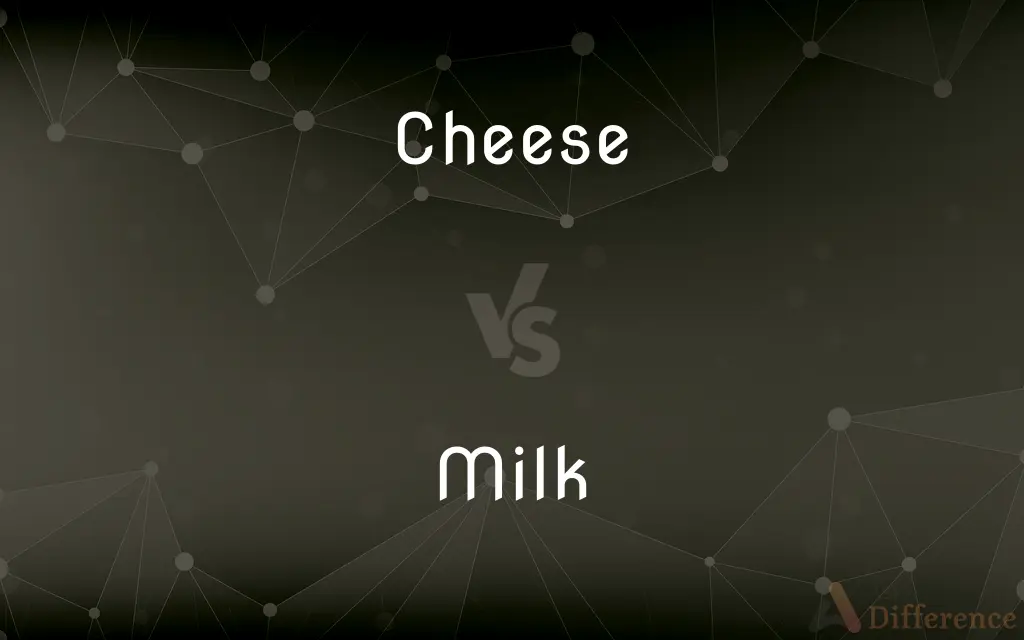Cheese vs. Milk — What's the Difference?
By Tayyaba Rehman — Updated on September 27, 2023
Cheese is a food product made from the curdling of milk, often aged. Milk is a liquid produced by mammals, primarily cows, consumed as a beverage or used in food products.

Difference Between Cheese and Milk
Table of Contents
ADVERTISEMENT
Key Differences
Cheese is a solid food product derived from the process of curdling milk and often involves aging. Milk, on the other hand, is a naturally produced liquid from mammals, most commonly from cows, which serves as a primary source for various dairy products, including cheese.
The production of cheese involves bacterial or acidic action on milk, which causes it to coagulate. Milk itself is consumed without this process, enjoyed in its liquid form, either pasteurized or raw.
Cheese varies in texture, flavor, and appearance based on the method of production, aging time, and other factors. Milk retains its liquid form, but can vary in taste and fat content, depending on the type, such as whole, skim, or 2% milk.
Cheese can be stored for longer durations, with some varieties intended for extended aging. Milk, conversely, has a comparatively shorter shelf life and can spoil if not consumed or refrigerated within a certain timeframe.
Nutritional profiles differ between cheese and milk. Cheese is often denser in calories and contains a higher fat content, while milk provides a good source of calcium, vitamins, and is often fortified with vitamin D.
ADVERTISEMENT
Comparison Chart
Form
Solid or semi-solid
Liquid
Production Process
Involves curdling and often aging
Natural secretion from mammals
Shelf Life
Longer, depending on type
Shorter, requires refrigeration
Nutritional Density
Denser in calories and fat
Rich in calcium and vitamins
Varieties
Numerous, based on aging and ingredients
Varies by fat content (whole, skim, 2%, etc.)
Compare with Definitions
Cheese
A product with varieties based on region or production methods.
Parmesan cheese is a staple in Italian cooking.
Milk
A white liquid produced by mammals, often consumed as a beverage.
She poured a glass of cold milk.
Cheese
A term describing something excellent or first-rate (slang).
That new song is the cheese!
Milk
Milk (also known in unfermented form as sweet milk) is a nutrient-rich liquid food produced by the mammary glands of mammals. It is the primary source of nutrition for young mammals, including breastfed human infants before they are able to digest solid food.
Cheese
Cheese is a dairy product, derived from milk and produced in wide ranges of flavors, textures and forms by coagulation of the milk protein casein. It comprises proteins and fat from milk, usually the milk of cows, buffalo, goats, or sheep.
Milk
An opaque white fluid rich in fat and protein, secreted by female mammals for the nourishment of their young
A healthy mother will produce enough milk for her baby
Cheese
A solid food prepared from the pressed curd of milk, often seasoned and aged.
Milk
Draw milk from (a cow or other animal), either by hand or mechanically
Two hours later he was up again to milk the cows
I had to start the milking
Cheese
A molded mass of this substance.
Milk
Exploit or defraud by taking small amounts of money over a period of time
Executives milked the health plan's funds for their personal use
Cheese
Something resembling this substance in shape or consistency.
Milk
A whitish liquid containing proteins, fats, lactose, and various vitamins and minerals that is produced by the mammary glands of all mature female mammals after they have given birth and serves as nourishment for their young.
Cheese
An important person.
Milk
The milk of cows, goats, or other animals, used as food by humans.
Cheese
To stop.
Milk
Any of various potable liquids resembling milk, such as coconut milk or soymilk.
Cheese
(uncountable) A dairy product made from curdled or cultured milk.
Milk
A liquid resembling milk in consistency, such as milkweed sap or milk of magnesia.
Cheese
(countable) Any particular variety of cheese.
Milk
To draw milk from the teat or udder of (a female mammal).
Cheese
(countable) A piece of cheese, especially one moulded into a large round shape during manufacture.
Milk
To draw or extract a liquid from
Milked the stem for its last drops of sap.
Cheese
A thick variety of jam (fruit preserve), as distinguished from a thinner variety (sometimes called jelly)
Milk
To press out, drain off, or remove (a liquid)
Milk venom from a snake.
Cheese
A substance resembling cream cheese, such as lemon cheese
Milk
To draw out or extract something from
Milked the witness for information.
Cheese
That which is melodramatic, overly emotional, or cliché, i.e. cheesy.
Milk
To obtain money or benefits from, in order to achieve personal gain; exploit
"The dictator and his cronies had milked their country of somewhere between $5 billion and $10 billion" (Russell Watson).
Cheese
Money.
Milk
To obtain the greatest possible advantage from (a situation).
Cheese
In skittles, the roughly ovoid object that is thrown to knock down the skittles.
Milk
To get the greatest effect from (a line or scene in a play, for example).
Cheese
A fastball.
Milk
To yield or supply milk.
Cheese
A dangerous mixture of black tar heroin and crushed Tylenol PM tablets. The resulting powder resembles grated cheese and is snorted.
Milk
To draw milk from a female mammal.
Cheese
Smegma.
Milk
(uncountable) A white liquid produced by the mammary glands of female mammals to nourish their young. From certain animals, especially cows, it is also called dairy milk and is a common food for humans as a beverage or used to produce various dairy products such as butter, cheese, and yogurt.
Skyr is a product made of curdled milk.
Cheese
(technology) Holed pattern of circuitry to decrease pattern density.
Milk
A white (or whitish) liquid obtained from a vegetable source such as almonds, coconuts, oats, rice, and/or soy beans.
Cheese
A mass of pomace, or ground apples, pressed together in the shape of a cheese.
Milk
An individual serving of milk.
Table three ordered three milks.
Cheese
The flat, circular, mucilaginous fruit of the dwarf mallow (Malva rotundifolia) or marshmallow (Althaea officinalis).
Milk
An individual portion of milk, such as found in a creamer, for tea and coffee.
I take my tea with two milks and two sugars.
I take my tea with two milk and two sugar.
Cheese
A low curtsey; so called on account of the cheese shape assumed by a woman's dress when she stoops after extending the skirts by a rapid gyration.
Milk
The ripe, undischarged spat of an oyster.
Cheese
(slang) Wealth, fame, excellence, importance.
Milk
Semen.
Cheese
The correct thing, of excellent quality; the ticket.
These cheroots are the real cheese.
Milk
(transitive) To express milk from (a mammal, especially a cow).
The farmer milked his cows.
Cheese
To prepare curds for making cheese.
Milk
To draw (milk) from the breasts or udder.
To milk wholesome milk from healthy cows
Cheese
(technology) To make holes in a pattern of circuitry to decrease pattern density.
Milk
To secrete (milk) from the breasts or udder.
Cheese
(slang) To smile excessively, as for a camera.
Milk
(transitive) To express a liquid from a creature.
The Australian government has a team that regularly milks various snakes for venom to use creating serums and antivenoms.
Cheese
(slang) To stop; to refrain from.
Cheese it! The cops!
Cheese your patter! (= stop talking, shut up)
Milk
To make excessive use of (a particular point in speech or writing, a source of funds, etc.); to exploit; to take advantage of (something).
When the audience began laughing, the comedian milked the joke for more laughs.
Cheese
(slang) To anger or irritate someone, usually in combination with "off".
All this waiting around is really cheesing me off.
Milk
(of an electrical storage battery) To give off small gas bubbles during the final part of the charging operation.
Cheese
To use a controversial or unsporting tactic to gain an advantage (especially in a game.)
You can cheese most of the game using certain exploits.
Milk
To single-mindedly masturbate a male to ejaculation, especially for the amusement or satisfaction of the masturbator rather than the person masturbated.
Controlled milking can actually establish and consolidate a mistress’s dominance over her sub rather than diminish it.
Cheese
To use an unconventional, all-in strategy to take one's opponent by surprise early in the game (especially for real-time strategy games).
Milk
A white fluid secreted by the mammary glands of female mammals for the nourishment of their young, consisting of minute globules of fat suspended in a solution of casein, albumin, milk sugar, and inorganic salts.
Cheese
(photography) Said while being photographed, to give the impression of smiling.
Say "cheese"! ... and there we are!
Milk
A kind of juice or sap, usually white in color, found in certain plants; latex. See Latex.
Cheese
The curd of milk, coagulated usually with rennet, separated from the whey, and pressed into a solid mass in a hoop or mold.
Milk
An emulsion made by bruising seeds; as, the milk of almonds, produced by pounding almonds with sugar and water.
Cheese
A mass of pomace, or ground apples, pressed together in the form of a cheese.
Milk
The ripe, undischarged spat of an oyster.
Cheese
The flat, circular, mucilaginous fruit of the dwarf mallow (Malva rotundifolia).
Milk
To draw or press milk from the breasts or udder of, by the hand or mouth; to withdraw the milk of.
I have given suck, and knowHow tender 't is to love the babe that milks me.
Cheese
A low courtesy; - so called on account of the cheese form assumed by a woman's dress when she stoops after extending the skirts by a rapid gyration.
Milk
To draw from the breasts or udder; to extract, as milk; as, to milk wholesome milk from healthy cows.
Cheese
A solid food prepared from the pressed curd of milk
Milk
To draw anything from, as if by milking; to compel to yield profit or advantage; to plunder.
They [the lawyers] milk an unfortunate estate as regularly as a dairyman does his stock.
Cheese
Erect or decumbent Old World perennial with axillary clusters of rosy-purple flowers; introduced in United States
Milk
To draw or to yield milk.
Cheese
Used in the imperative (get away, or stop it);
Cheese it!
Milk
To give off small gas bubbles during the final part of the charging operation; - said of a storage battery.
Cheese
Wind onto a cheese;
Cheese the yarn
Milk
A white nutritious liquid secreted by mammals and used as food by human beings
Cheese
A dairy product made from curdled milk, often aged.
Brie is a soft cheese known for its creamy texture.
Milk
Produced by mammary glands of female mammals for feeding their young
Cheese
A food resulting from pressed curds.
She sprinkled grated cheese on her pasta.
Milk
A river that rises in the Rockies in northwestern Montana and flows eastward to become a tributary of the Missouri River
Cheese
A mold-ripened or processed dairy product.
Blue cheese has distinct veins of mold giving it a unique flavor.
Milk
Any of several nutritive milklike liquids
Milk
Take milk from female mammals;
Cows need to be milked every morning
Milk
Exploit as much as possible;
I am milking this for all it's worth
Milk
Add milk to;
Milk the tea
Milk
A primary source for dairy products.
Milk is transformed into yogurt, butter, and cheese.
Milk
A liquid extracted from plants, such as almonds or oats.
She prefers almond milk in her coffee.
Milk
A secretion from certain animals, often toxic.
The snake's milk is used to make antivenom.
Milk
To exploit or draw from a resource continuously.
He tried to milk the situation for all its worth.
Common Curiosities
Is milk always a liquid?
Primarily, milk refers to a liquid, but there are "milks" from plants like almonds that mimic its consistency.
What is cheese made from?
Cheese is made from the curdling of milk, often aged.
How long can cheese be stored?
Depending on the type, cheese can be stored for weeks to years.
Does milk only come from cows?
No, milk can come from various mammals like goats, sheep, and even camels.
What gives milk its white color?
Milk's white appearance is due to the presence of casein and certain fats.
Is chocolate milk naturally occurring?
No, chocolate milk is milk with added chocolate and sweeteners.
Can lactose-intolerant individuals eat cheese?
Some cheeses, especially aged ones, have low lactose content and might be tolerated.
Why are there different types of cheese?
Cheese varieties result from differences in milk sources, production methods, and aging processes.
Can you freeze cheese and milk?
Yes, but the texture of cheese may change upon thawing, and milk should be thawed in the refrigerator.
Can cheese be made from non-animal milk?
Yes, there are cheeses made from plant-based "milks" like almond or soy.
Why is some milk pasteurized?
Pasteurization kills harmful bacteria in milk, making it safer to consume.
How is milk's fat content categorized?
Milk can be categorized as whole, 2%, 1%, skim, based on fat content.
Why does cheese melt?
Cheese melts due to its fat content and protein structure breaking down with heat.
What are the health benefits of milk?
Milk is a good source of calcium, protein, vitamins, and often fortified with vitamin D.
Are there non-dairy alternatives to cheese?
Yes, there are vegan cheeses made from ingredients like cashews, almonds, and soy.
Share Your Discovery

Previous Comparison
Worthy vs. Worthwhile
Next Comparison
Vital vs. CriticalAuthor Spotlight
Written by
Tayyaba RehmanTayyaba Rehman is a distinguished writer, currently serving as a primary contributor to askdifference.com. As a researcher in semantics and etymology, Tayyaba's passion for the complexity of languages and their distinctions has found a perfect home on the platform. Tayyaba delves into the intricacies of language, distinguishing between commonly confused words and phrases, thereby providing clarity for readers worldwide.













































